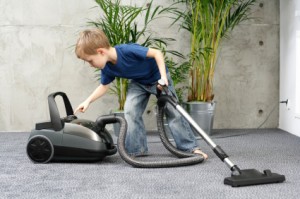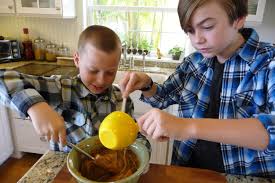Every year, I begin the school year with some simple tasks to get a “read” on my students. I even give good and bad examples of how to hole punch a paper or an easy way to use a glue stick that isn’t a  messy disaster. These first few days are observation days for me when it comes to knowing how my students will work together and cope with difficulty. For example, I might have thirty-five students in a class and maybe three of them will struggle with folding a paper book cover. That means, throughout the day in my four Language Arts classes, twelve students will find it very difficult to follow the directions for turning a brown paper bag into a book cover, so they will get help from others and move on. This isn’t the end of the world, of course, but it sometimes indicates a lack of experience for students that can be detrimental to their progress toward career- and college-readiness. We had a life-skills chat in class and 50% of my eighth graders had never made their own school lunch, 90% had only done it once or twice in their entire lives. Can they clear a jammed stapler, or more importantly, will they even try before asking for help? When it isn’t a stapler, it might be some other job-specific task when they need to take a risk, possible miss the mark, and cope with effort needed to try again.
messy disaster. These first few days are observation days for me when it comes to knowing how my students will work together and cope with difficulty. For example, I might have thirty-five students in a class and maybe three of them will struggle with folding a paper book cover. That means, throughout the day in my four Language Arts classes, twelve students will find it very difficult to follow the directions for turning a brown paper bag into a book cover, so they will get help from others and move on. This isn’t the end of the world, of course, but it sometimes indicates a lack of experience for students that can be detrimental to their progress toward career- and college-readiness. We had a life-skills chat in class and 50% of my eighth graders had never made their own school lunch, 90% had only done it once or twice in their entire lives. Can they clear a jammed stapler, or more importantly, will they even try before asking for help? When it isn’t a stapler, it might be some other job-specific task when they need to take a risk, possible miss the mark, and cope with effort needed to try again.
 From my perspective as a teacher, parents can help their by providing experiences while providing minimal help. Students must gain confidence by making attempts at simple tasks, problem-solving, and finding their own solutions in order to be willing to take other kinds of risks (like participating in class or taking on a special project in school). Please consider the following simple age appropriate tasks that children can do. These are borrowed from a few parenting sites:
From my perspective as a teacher, parents can help their by providing experiences while providing minimal help. Students must gain confidence by making attempts at simple tasks, problem-solving, and finding their own solutions in order to be willing to take other kinds of risks (like participating in class or taking on a special project in school). Please consider the following simple age appropriate tasks that children can do. These are borrowed from a few parenting sites:
AGE 6-7:
|
AGE 8-9:
|
AGE 10-11:
|
AGE 12 AND OLDER:
|

Having a focus on academics is definitely important, but students also need a balance of life skills to be successful. After fifteen years of teaching students, I find some of the most successful children are the same ones willing to attempt simple tasks like organizing the classroom shelves or fixing their own broken backpack zipper, and those risk-takers are often the ones whose parents have assigned regular chores and responsibilities (that happen daily) to build life skills.
If you are a student and you want to try more skills at home, talk to your parents and take on a few responsibilities to prove to them just how successful you can be. It’s possible that they might be so impressed that your improved life skills might earn greater privileges! Good luck!
